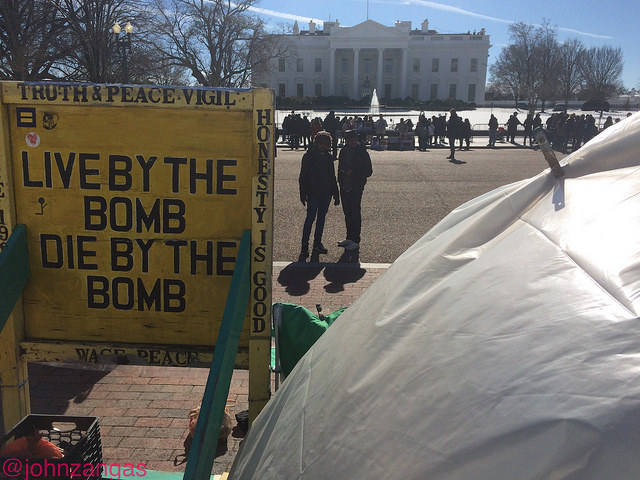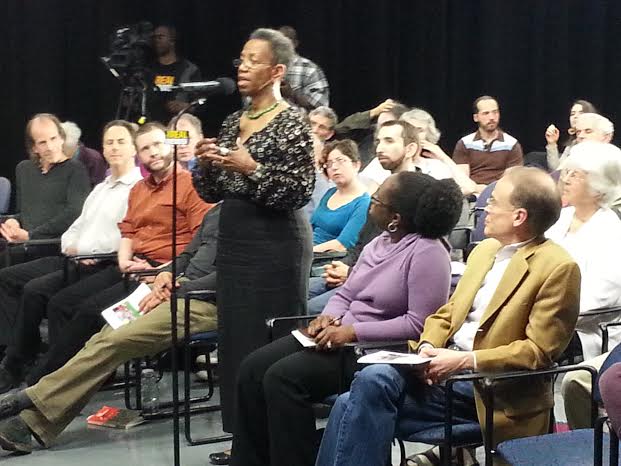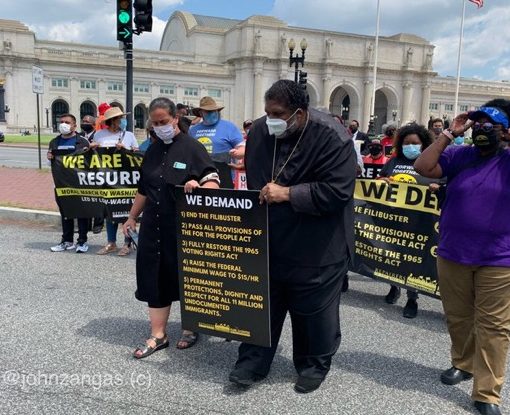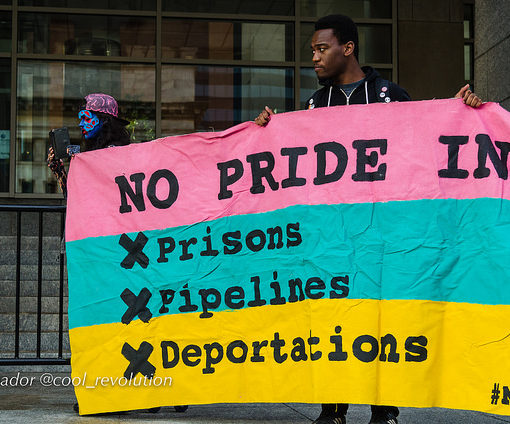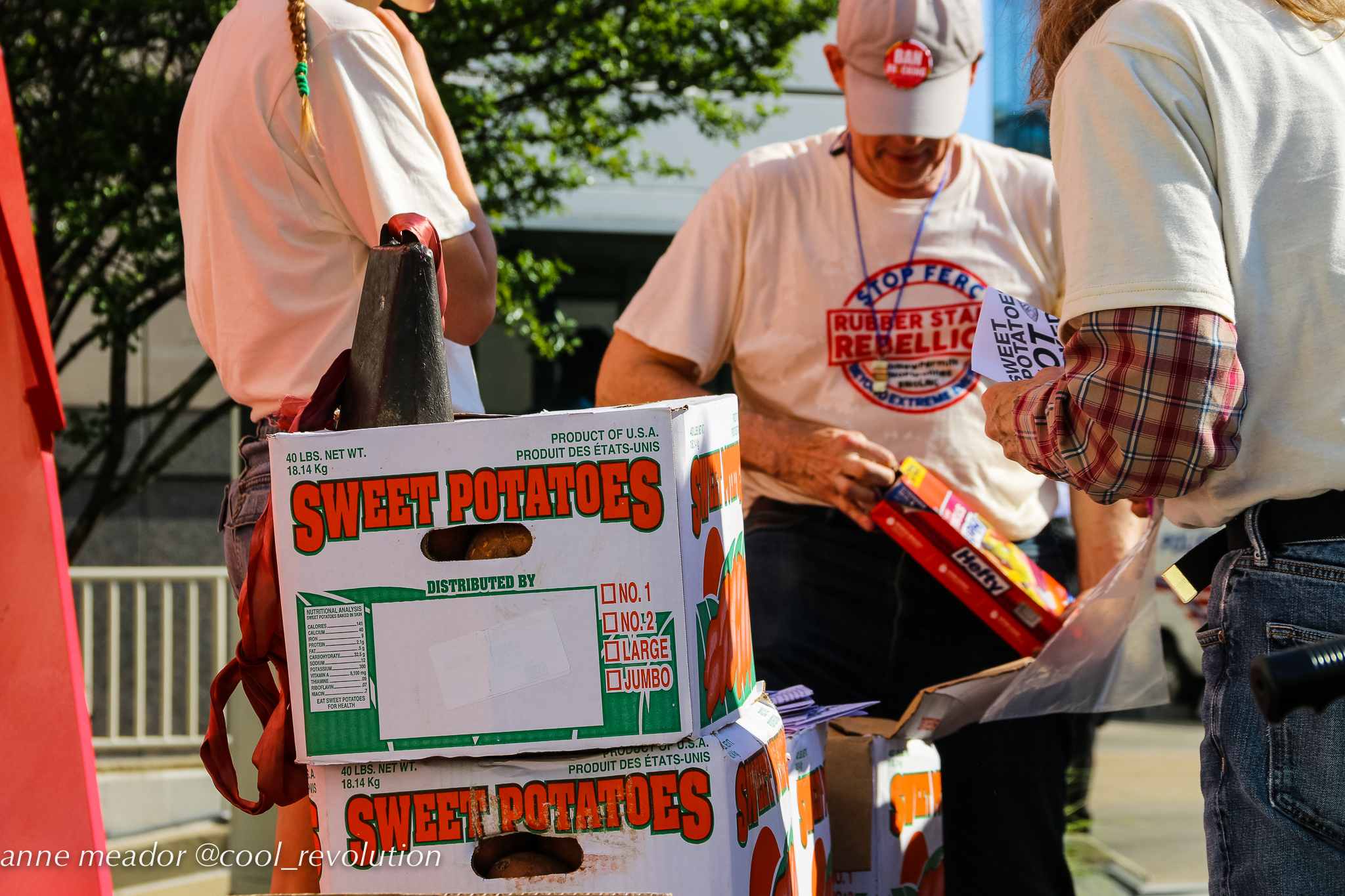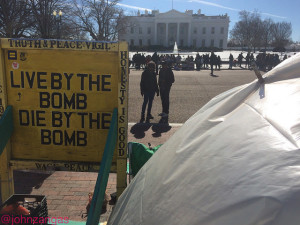 The future of the longest-running peace protest in the U.S. recently came into question when its co-founder, Concepcion Picciotto, passed away on January 25. Picciotto was largely responsible for keeping the anti-nuclear vigil in front of the White House going since its beginning in August 1981. Long dreaded, her death is mourned by supporters and fellow volunteers who have kept the peace vigil going for 34 years. Her absence also creates a practical problem: how to cover the long shifts she put in every day through all kinds of weather.
The future of the longest-running peace protest in the U.S. recently came into question when its co-founder, Concepcion Picciotto, passed away on January 25. Picciotto was largely responsible for keeping the anti-nuclear vigil in front of the White House going since its beginning in August 1981. Long dreaded, her death is mourned by supporters and fellow volunteers who have kept the peace vigil going for 34 years. Her absence also creates a practical problem: how to cover the long shifts she put in every day through all kinds of weather.
Filling her shoes will be a daunting task, if it can even be done. But there is one person willing to take on the responsibility.
Philipos Melaku-Bello sits in the opening of the vigil’s white plastic tent, wrapped in a heavy blanket on a cold night. He has taken on the coordinator role to arrange scheduling shifts at the vigil. He wears a knitted cap over dark locks which extend almost to the ground. A wisp of grey sprouts from his beard at his chin, giving him a sage-like appearance. In a soft yet determined voice, he says that he plans to keep the vigil going at all costs, even if he has to do it all by himself.
The peace vigil tent hovers like a ghost refusing to leave the brown bricks on the sidewalk across Pennsylvania Ave. The white plastic tarp is propped up on a thin iron skeleton, providing little relief from the calloused winter elements. Standing on either side are two giant yellow wooden signs held in place by weights. A leg of one has begun to decay. The signs were built ten years ago by William Thomas, the vigil’s founder. Both signs stand like sentinels warning of possible outcomes of nuclear war. “Live By The Bomb, Die By The Bomb,” reads one in black block letters; “Ban All Nuclear Weapons or Have a Nice Doomsday,” says the other.
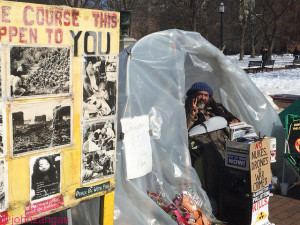
Picciotto was unwavering in her commitment to it as she worked in cooperation with William Thomas. She even kept watch after a taxi cab knocked her off her bike, breaking her arm two years ago. At present there are a just a few other peace activists willing to help because cold winter nights and unpredictable weather make sitting for long periods difficult.
Just before Picciotto died, Melaku-Bello and another activist, Craig Thompson, endured the historic Blizzard of 2016. They teamed up during the 36-hour storm with Melaku-Bello staying in the tent on a two-day marathon, while Thompson periodically shuttled hot water refills and battery charge-ups. They shared soup, nuts, coffee and tea while knocking snow off the tent to keep it from collapsing. They rested little during the intense storm, one of the top blizzards ever recorded in Washington, DC. Good Samaritans visited with hand warmers, hats, gloves and scarves to help keep them warm. Melaku-Bello said that the two days of bitter cold and snow were his most difficult period at the vigil.
Melaku-Bello has been involved with the vigil on and off when William Thomas occasionally asked him to cover shifts beginning in the ’90s. He has a vast knowledge of political movements and much experience with activism. He has been involved in the peace movement since he was twelve when his uncle took him to Vietnam War protests. His father was a peace activist as well, protesting the Korean War.
He has good rapport with tourists and the ability to communicate with many foreign visitors, since he speaks eight languages fluently–including several African languages he learned while he lived in Ethiopia. He speaks Portuguese, Spanish, Amharic, Ge’ez, Guragegna, Walaita, and Que’chua as well as English.
For the week after Picciotto passes away, Melaku-Bello puts in 18-hour shifts at the vigil. Toward the evening he grows tired, yet still engages anyone who shows any interest.
He easily converses with a woman in Portuguese, who is from South America and interested in why he is there. She speaks with him about war and nuclear armaments and takes a picture as he hands her a flyer. His subtle conversation and gentle demeanor has easily coaxed questions from the tourist and like an ambassador of peace, kindled thoughtful discussion about legacy nuclear weapons. He opens dozens of minds every day to the lurking danger of nuclear weapons and the need to disarm.
He is hoping others will step up for 4- or 6-hour shifts to help take up the slack so he can rest. He cannot abandon the vigil even for a little while, because if he does, the U.S. Park Police will come and confiscate the signs and tent, ending over three decades of peace activism there.
U.S Park police have removed the vigil at least twice, hauling away the tent and signs. Both times, however, Congresswoman Eleanor Holmes-Norton intervened in the matter, and the vigil was restored the next day.
The vigil has also been forced to move every four years from its coveted spot on the sidewalk to the back of Lafayette Park during Presidential Inaugural parades. Its permanent location is where bleachers are assembled for dignitaries during the parade.
A spokesperson for the U.S. Park Service said Park Police plan to let the peace vigil continue.
“Lafayette Park is one of our nation’s foremost civic spaces for the exercise of First Amendment rights,” said Sgt. Anna Rose. “The death of Ms. Picciotto does not change the standing of the vigil. A demonstration involving 25 or fewer persons may be held without a permit at Lafayette Park,” she said. “As long as the vigil is attended, it will be allowed to remain.”
A week after Concepcion’s death, Barry Knight joins Melaku-Bello at the peace vigil at about 9pm. Knight affixes two new signs he made from hard white board and black sharpie to William Thomas’ big yellow signs. One sign reads, “Imagine Peace” and another is a quote about terrorism by Noam Chomsky.
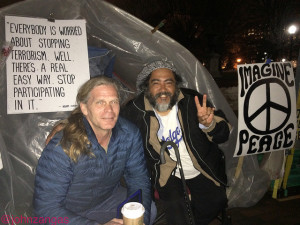
Melaku-Bello chats with Knight about the upcoming presidential election later this year, the Syrian conflict, perpetual wars in the Middle East, and other issues related to the Peace Vigil. The conversation shifts to tentative plans for Picciotto’s funeral service to be held on February 27. Knight will only be here a week, so Melaku-Bello must work fast to secure help.
His hope is that other committed activists will join him soon in keeping the vigil alive. He realizes he can’t sit these long shifts alone much longer.
The vigil represents many thousands of hours put in by hundreds of activists who have volunteered over the last 35 years. On an average day hundreds of tourists pass by, originating from all countries of the world. The tourists pause to talk with the activists about why they are there and often take pictures.
This is where the vigil has its most impact, Knight believes, by reaching out to the thousands who have visited it and engaging them in talking about nuclear weapons. He doesn’t know if the vigil has made a difference in nuclear disarmament, but Melaku-Bello notes that the number of nuclear weapons is half of what it was when the vigil started.
“This is the one spot if you want to speak truth to power, you really couldn’t pick a better spot,” Knight said of the Peace Vigil. “And we have to speak truth to power.”
Five presidents have been elected and lived in the White House since the vigil began, yet no president has ever visited his neighbor across the street. Perhaps it’s not politically correct for the president of the world’s most potent nuclear arsenal and mightiest military to acknowledge the central message of what is now known as the longest running peace protest in the nation’s history.
“I want world peace,” said Melaku-Bello. “I may not get it in my time, but the nuclear issue, I want that taken care of.”
To volunteer for the vigil, you can text Philipos Melaku-Bello at (571) 235-3817, or leave your number with one of the activists at the Peace Vigil. Donations of food supplies can be sent to: 8511 Lancashire Dr., Springfield, VA 22151.

